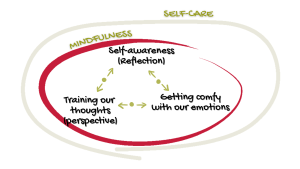Emotional resilience is super important in navigating life’s challenges. And one key ingredient to building emotional resilience is practicing self-compassion. When we treat ourselves with kindness, understanding, and acceptance, especially during shitty times, we’re more likely to develop the ability to cope with stress as well as those time when life is just feeling like a bit of a rough ride.
Self-compassion is a powerful tool in regulating our emotions and managing stress. It helps us maintain a positive outlook and cope with challenges far better, reducing the risk of developing mental health issues such as depression and anxiety. When we’re less critical of ourselves, we’re more likely to persevere through those shitty times, and stay hopeful and motivated.
There are so many fantastic books out there that can help foster some self-compassion. Here are 17 good reads which I think offer a little something for everyone as there is a varied range of writing styles and perspectives. If this is your first attempt at delving into some touchy feely stuff, if my synopsis doesn’t offer you any clarity on where to start, I would suggest reading both the positive and negative reviews of these books to see which jump out at you.
1. Self-Compassion: The Proven Power of Being Kind to Yourself by Kristin Neff

This book is all about understanding what self-compassion is, why it’s important, and how you can develop it in your life.
Neff shares her own experiences with struggling to be kind to herself and uses examples from her research to help readers understand how self-compassion can benefit them. She also provides practical exercises and tips to help readers incorporate self-compassion into their daily lives.
Whether you’re dealing with a difficult situation or simply wanting to improve your emotional resilience, “Self-Compassion” can help you learn how to treat yourself with kindness, understanding, and acceptance.
Kristin Neff is considered the Queen of Compassion, so if you’re looking to build your self-compassion, this wouldn’t be a bad place to start.
Kristin has also authored a workbook on building self-compassion, called “The Mindful Self-Compassion Workbook: A Proven Way to Accept Yourself, Build Inner Strength, and Thrive.” It provides practical exercises, meditations, and tools to help individuals develop a more compassionate relationship with themselves. The workbook is based on Neff’s research on self-compassion and the Mindful Self-Compassion program she developed with Christopher Germer.
2. The Subtle Art of Not Giving a F*ck
by Mark Manson

It was this book that introduced me to Mark Manson’s no-nonsense approach to personal development. But don’t misinterpret no-nonsense for lacking compassion. Far from it. This book is a counterintuitive approach to self-improvement, focusing on accepting and embracing life’s uncertainties and challenges rather than trying to avoid them. It encourages readers to prioritise their values and let go of negative thoughts and behaviours that do not serve them.
This book encourages you to stop giving so many f*cks about things that don’t matter. It’s not just a matter of saying “I don’t care” to everything in life. Instead, the book argues that we should choose what we care about and focus on those things, rather than trying to please everyone and stressing ourselves out in the process.
Manson suggests that a lot of our stress and anxiety comes from worrying about what other people think of us. We’re so afraid of being judged or rejected that we sacrifice our own happiness and well-being. But if we learn to be more self-compassionate, we can start to prioritise our own needs and feelings over the opinions of others.
The book isn’t about being selfish, though. It’s about finding a healthy balance between caring for ourselves and caring for others. By practicing self-compassion, we can actually become better equipped to help others and contribute to the world in a more meaningful way.
I feel that Mark Manson has definitely improved with age and his resources are a good, down to earth approach in dealing with every day struggles.
3. 12 Rules for Life: An Antidote to Chaos by Jordan Peterson

Peterson basically argues that in order to find meaning and purpose in life, we need to take responsibility for ourselves and our actions. He outlines 12 rules that can help people live a more meaningful life.
Peterson believes that we should treat ourselves as if we’re someone we’re responsible for helping. In other words, we need to have compassion for ourselves in order to truly take care of ourselves and take responsibility for our lives.
He also talks about the importance of acknowledging our own flaws and limitations, and not being too hard on ourselves when we make mistakes. So, in a way, self-compassion is woven throughout the book as a key component of taking responsibility for our own lives and finding meaning in what he refers to as chaos.
Although I am not in agreement with all of Peterson’s views, and if you don’t have the money to pay for a therapist, I do feel that subscribing to his Youtube channel is a pretty good resource to gain a better understanding on how best to navigate the challenges of life.
4. The Power of Now by Eckhart Tolle

This book really “does exactly what it says on the tin”. It teaches you the power of “now”. Tolle argues that we spend too much time dwelling on the past or worrying about the future, which causes unnecessary stress and anxiety. By focusing on the present moment, we can free ourselves from judgment, self-criticism and negative emotions and cultivate self-compassion.
Tolle suggests that we can achieve this state of presence through meditation and mindfulness practices. “The Power of Now” is a powerful reminder that the only moment that truly matters is the present.
This book was actually my first experience into what I perceived as ‘the world of woo woo’ at that time. I also listened to the audio version narrated by Tolle himself, which I have to be honest, I found really creepy. If you listen to him, you might understand what I mean. But this book had been suggested in loads of the narcissistic abuse recovery literature, and with my mental health in the gutter at the time, I persisted. I have reread this book a couple of times over the last few years and have found some more nuggets to take away on each occasion.
5. The Gifts of Imperfection by Brené Brown

Brown argues that true happiness and fulfilment come not from striving for perfection, but rather from embracing our imperfections and being kind to ourselves. The book provides practical advice on how to cultivate self-compassion and overcome feelings of shame and inadequacy. Brown emphasises the importance of setting healthy boundaries, cultivating gratitude, and practicing mindfulness as a way to build resilience and find joy in life.
I have put this book of Brown’s on my list, but to be honest, if you’re starting out in building self-compassion for self-love and emotional resilience, just about any of Brown’s books will do the trick.
6. The Art of Asking by Amanda Palmer

This is an inspirational memoir that explores the power of vulnerability and connection. Palmer shares her personal journey as a musician and the importance of asking for help when needed, both in her career and personal life. She emphasises that asking for help is not a weakness, but rather a strength that requires self-compassion and the willingness to be vulnerable. I would argue that that is not strength, but rather courage. Having particularly struggled with this myself, I know that being told it was a strength to reach out for help, when I desperately needed to, just plain pissed me off. But through her experiences, she demonstrates that when we let go of our fears and open ourselves up to others, we can find the support we need to thrive. The book offers practical advice on how to overcome the fear of asking and how to cultivate a sense of self-compassion and courage to reach out to others.
7. Braving the Wilderness by Brené Brown

This book is all about finding belonging and connection in today’s polarized world. Brown encourages readers to embrace their true selves, even if it means standing alone and being vulnerable. She stresses the importance of staying true to one’s values and beliefs, even if it means being criticized or rejected by others. Through personal stories and research, Brown emphasises the power of self-compassion and empathy in building authentic connections with others. The book challenges readers to step outside their comfort zones and be brave enough to embrace their unique identities, while also fostering compassion towards themselves and others. Overall, it’s a powerful reminder that true belonging starts with self-acceptance and self-compassion. I know there is already a Brené Brown book on this list, and I have to be honest, by the time I’d got to this book of Brené Brown’s, I’d got a little bored with her books. This one however was a game changer for me as I was struggling with a loss of identity following a narcissistic type relationship. You know that feeling when something comes along just when you need it. This book was one of those for me.
8. Radical Acceptance by Tara Brach

This book is a guide to embracing ourselves and our lives with kindness and compassion. Brach argues that our inner critic often leads to self-judgment and suffering, and that we must learn to accept ourselves and our experiences without judgment. Easier said than done I know. But she provides practical tools, such as meditation and mindfulness practices, to help us cultivate self-compassion and deepen our understanding of ourselves. Brach encourages readers to let go of perfectionism and embrace their imperfections, ultimately leading to greater peace and happiness. I personally struggle listening to Tara Brach but this book is a great read for anyone who struggles with self-criticism and recognises the need for a more loving and accepting relationship with themselves.
9. The Mindful Path to Self-Compassion by Christopher Germer

This book is a practical guide to cultivating self-compassion through mindfulness. Germer emphasises the importance of being kind to oneself, especially during difficult times. He offers a variety of mindfulness practices to help readers become more aware of their thoughts, feelings, and physical sensations, and to respond to them with self-compassion rather than self-criticism. The book is grounded in scientific research and provides clear explanations and step-by-step instructions for each mindfulness exercise. Germer also includes real-life examples and anecdotes to illustrate the power of self-compassion. Overall, “The Mindful Path to Self-Compassion” is a valuable resource for anyone looking to develop greater self-awareness and self-compassion in their daily life.
10. The Four Agreements by Don Miguel Ruiz

This book is a practical guide for living a happy and fulfilling life. In the book, Ruiz presents four simple yet powerful agreements that readers can make with themselves to improve their relationships and overall well-being. The agreements are: be impeccable with your word, don’t take anything personally, don’t make assumptions, and always do your best. By following these agreements, Ruiz argues that individuals can free themselves from negative beliefs and behaviours that prevent them from living their best lives. The book encourages readers to approach themselves and others with kindness and understanding which fosters self-compassion and compassion for others.
11. Nonviolent Communication: A Language of Life by Marshall B. Rosenberg

This book teaches a communication process that focuses on compassionate and respectful interactions. It emphasises the importance of using compassionate language when talking to oneself, as well as understanding one’s own needs and feelings. It encourages readers to identify and acknowledge their own emotions without judgment or self-criticism, and to communicate their needs to themselves and others in a way that fosters understanding and respect. The book provides practical tools and strategies for improving communication with oneself and others, which can lead to increased self-awareness, self-acceptance, and self-compassion.
The basis of this book is that all humans have the capacity for compassion and only resort to violence or harmful behaviour when they do not recognise more effective ways of getting their needs met. Rosenberg argues that by learning to communicate with more clarity, compassion, and understanding, people can create more fulfilling and meaningful relationships with others and emphasises that it is difficult to be compassionate towards others if one does not have a compassionate relationship with themselves. An essential read for anyone and everyone.
12. The Miracle of Mindfulness by Thich Nhat Hanh

This book emphasises the importance of being kind and gentle towards oneself. Thich Nhat Hanh encourages individuals to practice self-compassion by being mindful of their thoughts and feelings, and treating themselves with kindness and understanding. He suggests that self-compassion can help release negative emotions, reduce stress, and improve overall well-being.
Through the practice of mindfulness, individuals can develop a greater awareness of their inner experiences, including negative self-talk and self-criticism. This awareness can help individuals to respond to themselves with greater compassion and understanding, reducing feelings of shame and self-blame.
This is a beautiful and insightful book. Thich Nhat Hanh is another one of those authors, that no matter which of his books you read, there are going to be loads of nuggets to take away. He was a truly lovely soul.
13. 10% Happier by Dan Harris

“10% Happier” is a memoir by Dan Harris that explores his journey towards finding happiness and inner peace through mindfulness meditation. Harris, a news anchor who suffered from panic attacks and substance abuse, discovered the benefits of meditation after having a nationally televised panic attack. In the book, he shares his experiences with meditation and interviews with experts in the field. Although the book doesn’t focus explicitly on self-compassion, Harris emphasises the importance of being kind and patient with oneself while cultivating mindfulness, and how this can lead to a more fulfilling life. Overall, “10% Happier” offers a relatable perspective on the benefits of meditation and the importance of self-care.
14. A Guide to the Good Life: The Ancient Art of Stoic Joy by William B. Irvine

This book is all about finding happiness by embracing the ancient philosophy of Stoicism. The book is a practical guide to living a good life, and it explores the idea of self-compassion as a way to achieve acceptance of self and contentment. Irvine argues that we can learn a lot from the Stoics, who believed that the key to happiness is to focus on what we can control, and let go of what we cannot. He suggests that we can cultivate self-compassion by accepting our flaws and weaknesses, and treating ourselves with kindness and understanding. By doing so, we can develop a greater sense of well-being and joy in life that is not dependent on external circumstances.
In this book Irvine also provides practical advice and exercises to help readers integrate Stoicism into their daily lives, including methods for dealing with anxiety, anger, and disappointment.
15. Buddhism Plain and Simple by Steve Hagen

This is a great introduction to Buddhism and its core teachings. It offers a practical approach to Buddhist philosophy, with an emphasis on mindfulness and self-awareness. Hagen encourages readers to develop a greater sense of self-compassion by letting go of attachment and embracing uncertainty. By understanding the nature of suffering and the uncertainty of all things, readers can foster a sense of acceptance and compassion towards themselves and others.
16. Man’s Search for Meaning by Viktor E. Frankl

This is a powerful and inspiring book that tells the story of Frankl’s experiences in Nazi concentration camps during World War II. Despite the unimaginable suffering and loss he endured, Frankl discovered a sense of purpose and meaning that helped him survive the horrors of the camps. He believed that even in the most dire circumstances, individuals have the power to choose their attitudes and find meaning in their lives.
Frankl’s message is one of hope and resilience, and it speaks to the importance of self-compassion. By focusing on our inner strengths and values, even in the face of adversity, we can find a sense of purpose and fulfilment. The book challenges readers to reflect on their own lives and consider what truly matters to them. It’s a reminder that no matter how difficult life may be, we have the power to persevere and find meaning in even the most challenging circumstances.
I don’t do war stories but after caving in to loads of nudging to read this book, I am truly grateful for the many messages that Frankl shares in this book. I know I have put this book at no.16 on my list, but I would have to say that this is one of my favourite books ever.
17. The Denial of Death by Ernest Becker

This book is all about how people deal with the fact that they’re going to die. Becker argues that we all have this fundamental fear of death, and that we go to great lengths to deny or avoid it. This can lead us to do some pretty messed up things, like seeking power or fame, or even engaging in acts of violence or war.
But the book also offers a way out of this cycle of denial and fear. By acknowledging our mortality and accepting the reality of death, we can actually live more fully and authentically. We can embrace our imperfections and limitations, and find a sense of peace and compassion for ourselves and others.
This book is definitely not for the faint of heart. But overall, “The Denial of Death” is a thought-provoking and at times unsettling read, but it ultimately offers a hopeful message about the power of self-awareness and self-compassion and how we can look at death in a whole new way.
A takeaway
You will notice a theme across almost all these books is mindfulness. In A Recipe for Building Emotional Resilience By Nurturing Self-love I hope I will convince you of the importance of mindfulness in building a healthy level of emotional resilience – and emotional resilience is an essential element for happiness.
Without emotional resilience, life’s challenges will constantly lead us to living a life of struggle. And one key ingredient to building emotional resilience is practicing self-compassion. When you treat yourself with kindness, understanding, and acceptance, especially during tough times, you’re more likely to develop the ability to cope with all the shit that life throws at you.
Life does not exist without suffering. Emotional resilience allows us to overcome that suffering in a positive way. And with the lessons learnt from overcoming our suffering, it offers us the opportunity to know how to create more positive experiences in our lives. These lessons help strengthen our emotional resilience creating the ability to shorten our time suffering and therefore allowing more time to experience joy in our lives.
To get more titbits to help you build self-awareness and all things self-loving to become emotionally resilient, sign up to my newsletter and see how your relationship not only improves with yourself, but with those you care about too.![]()




